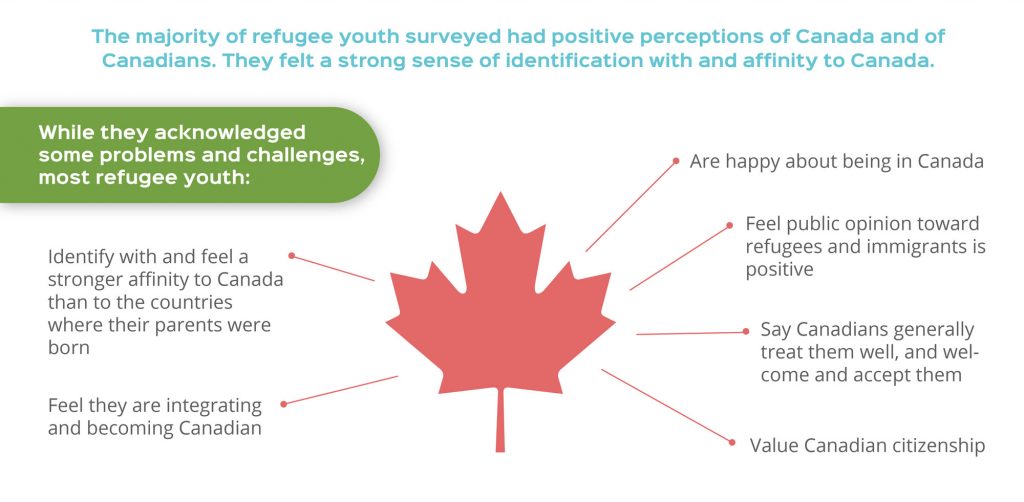Identification with, and Affinity to Canada
Researchers: Joseph Garcea
Affiliation: University of Saskatchewan
Keywords: Refugees, refugee youth, settlement and integration of refugee youth, ethnocultural and political identities of refugee youth, citizenship and refugee youth, refugee youth in Canada
Jump to: Full Infographic, Methodology, Findings, Publications & Reports
Summary
Objective: This research sheds light on the perceptions of, identification with, and affinity to Canada among refugee youth in Western Canada. Researchers sought to determine youths’ perspective about their social engagement and social relationships; the nature and effects of public opinion regarding refugees; how they and their families are treated, welcomed, accepted, and included by Canadians; and their bonding with Canada and Canadians.
Justification: Considering ongoing global migration of young refugees and questions about what factors contribute to integration, marginalization, and radicalization, research is needed to develop a fuller understanding of their perspectives.
Practical goal: This research provides insight into youths’ settlement and integration experiences, and offers recommendations on services and supports for refugee youth.
Primary audience: Service providers, policy makers, and the public
Infographic Excerpt

Methodology
The research data was collected through an online survey involving a nonrandomized sample of 52 self-selected refugee youth. Participants were aged 16 to 24 years and had lived in Canada for one to five years prior to the survey. Participants were recruited by settlement service agencies in seven cities in Western Canada (Vancouver city region, Calgary, Edmonton, Regina, Saskatoon, Winnipeg, and Brandon).
Findings
Perceptions of Canada
Most respondents said that they liked living in Canada and perceived Canada as a peaceful and prosperous country governed by liberal democratic principles, including the rule of law and the recognition and protection of minority rights.
- Aspects that respondents did not like about living in Canada included: loneliness, racism and discrimination, the challenges of economic and social integration, and the high cost of living.
Respondents ranked their family, school, friends, and community as the most influential on their perspective.
Perceptions of Bonding with Canadians
Most respondents had dual national or ethnocultural identities and affinities but indicated that their strongest attachment was to the ‘Canadian nation’.
- All participants valued Canadian citizenship and aspired to acquire it.
Social Engagement and Relationships
Most youth were socially engaged in terms of involvement in sports, recreation, and hobbies. Males were more likely to be involved in sports and recreation while females were more involved in hobbies.
31.25% of male participants indicated they had a lot of friends, while only 13.3% of female participants indicated this.
A large percentage of respondents indicated that their friends were mostly of non-Canadian heritage. Younger respondents (aged 16-18) were more likely to have Canadian friends than their slightly older peers (aged 19-24).
Perceptions of Public Opinion, Treatment and Acceptance of Refugees
Ninety percent felt that public opinion about refugees in Canada was either good or very good, and that it had a positive effect on them and their families.
Most felt that they and their families were treated well or very well by Canadians, while a minority (21.6% to 28.8%) indicated that they, their families, or their friends had been treated badly or very badly.
Over 90% of respondents perceived Canada as a welcoming place for refugees and immigrants.
Respondents’ sense of being included by Canadians was not as high as their sense of being accepted by Canadians.
Explore more projects


